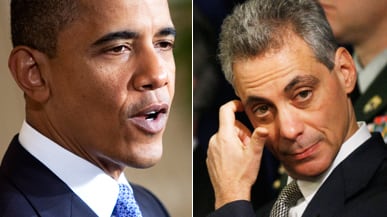The Democrats are in for a thumping on Tuesday, and it’s the departed White House chief of staff’s fault. Eric Alterman on Emanuel’s failed electoral strategy—and the shape of the party to come. Plus: Check out the latest on all the hot races at The Daily Beast's Election Oracle.
No president could hope to see his party succeed in a midterm election where unemployment hovers near ten percent—actually over sixteen percent if you count the people who have given up looking for a job. But the size and scope of the shellacking the Democrats are about to earn in Tuesday’s midterms is at least in part the result of political malpractice on the part of the president’s spin doctors together with strategic errors made by his ex-chief of staff Rahm Emanuel, beginning in 2006.
The Obama presidency was based on two strategic premises: First was what might be called the Rodney King plan. Obama would say to the Republicans, “Why Can’t We All Just Get Along?” and turn down the dial on the rhetoric from eleven to two or three. Second, this presidency would Get Things Done: big things, things that no other modern president could manage. To do this, he needed to compromise on virtually every one of this campaign promises, but so be it.
The net result, Obama’s team insists with some justice, has been is the most consequential Democratic presidency in nearly half a century. The stimulus bill, middle class tax cut, the student loan reform bill, the health care bill, the financial reform bill, to say nothing of saving the economy from a second Great Depression—and all of it accomplished in just eighteen months-- look pretty good alongside the failures of Bill Clinton or Jimmy Carter to achieve anything remotely comparable. On the other hand, nobody seems to know or care except the people who opposed them. According to a recent Politico poll, most Americans see the past legislative session as a failure. Only 23 percent of those polled thought Congress accomplished more than usual, with only 15 percent independents agreeing with this assessment.

Meanwhile, another poll, this one from New York Times/CBS News, found that fewer than one in 10 respondents knew that the Obama administration had lowered taxes for most Americans; which was fewer than a third as many who mistakenly believed that their taxes had actually risen.
Emanuel created an entire class of legislators who, either for reasons of ideology or perceived political vulnerability, felt more comfortable undermining the president’s agenda than supporting it.
What explains this? Well, the short answer is that for all the brilliance of the Obama campaign, and the kudos earned by Rahm Emanuel for the Democratic gains of 2006 and 2008, these people have played some pretty dumb politics. Emanuel’s recruitment of a whole host of conservative-leaning Democrats in places that normally send Republicans to Congress created an entire class of legislators who, either for reasons of ideology or perceived political vulnerability, felt more comfortable undermining the president’s agenda than supporting it.
• Peter Beinart: Obama Needs an Enemy• Gloria Feldt: Why Women Are Fed Up(Can you believe that the campaign actually considered naming this guy vice president?) When combined with a recalcitrant Republican Party whose leaders held no interest in cooperation but plenty in stringing the White House along until it pulled the rug out from under him, Obama was forced to water down his agenda until the bills he fought so hard to pass lacked the essential elements necessary to make them matter to people.
Remember the big fight over the size of the stimulus between Paul Krugman and Rahm Emanuel? Krugman said it was too small, and too tax-cut oriented to work. Emanuel did not disagree on the merits, only on the politics. Critics like Krugman, he told The New Yorker’s Ryan Lizza, “have never worked the legislative process… My view is that Krugman as an economist is not wrong. But in the art of the possible, of the deal, he is wrong. He couldn’t get his legislation.”
Thing is, Krugman was right. Not only was the stimulus too small to make a sufficient impact on the unemployment rate to give Democrats a fighting chance in this election, the willingness of the White House to make it Republican-friendly ensured that people would barely notice its effects. The enormous emphasis on tax cuts--like the ones ninety percent of Americans have never heard of—rather than say, a green jobs program like mass transit investment or school construction that would have helped people understand just what this president stood for. Over and over during his first two years, Obama watered down his goals without winning any Republican cooperation in the process. In doing so, he alienated his own side, and failed, simultaneously to protect the Republican-lite candidates Emanuel had worked so hard to recruit--the vast majority of whom will begin packing up their offices Wednesday morning.
The Wall Street Journal reports, “White House Chief of Staff Rahm Emanuel's exit several weeks ago, meanwhile, robbed the president of one of his most powerful policy strategists. But the truth is, Dick Daley’s decision to open up Rahm’s dream job is the best political news the Democrats have had all year. The strategy of Emanuel’s White House was to take any deal that was on the table and then expect the public to express its gratitude at the results. This was consistent with Obama’s belief, as expressed by one of his early Chicago mentors, Denny Jacobs, to Obama biographer David Remnick, "Sometimes you can't get the whole hog, so you take the ham sandwich."
And in another time, it might have worked. But Jon Stewart’s rally this weekend not-withstanding, American politics has travelled too far down the crazy road for such reasonableness to be saleable. Thanks again, to the timidity of members of his own party, the Tea-Party takeover of the Republican Party, and a news cycle driven by nutty cable news hosts and talk-radio jocks, Obama is being called a Socialist, a Nazi, a Kenyan, and the re-incarnation of a “philandering, inebriated African socialist, who raged against the world for denying him the realization of his anticolonial ambitions.”
Meanwhile, his base, after being cursed by Emanuel, mocked by Robert Gibbs, and chided as childish by Obama himself, finds itself in no mood to offer up much of a defense.
After Tuesday, the Democrats in Congress will be, of necessity, a smaller leaner group that is on the whole, more ideologically coherent than they have been in decades. It should be a lot easier for them to agree on a common course of action, particularly in light of the outrageous demands that the new Republican majority in the House will be making every day. In this mix, a Rahm-less Obama should be able to find his mojo again, and return to the rhetoric that won him the presidency in the first place. If not, well, ….Hello President Palin.
Eric Alterman is a professor of English and journalism at Brooklyn College and a professor of journalism at CUNY Graduate School of Journalism. He is the author, most recently, of Why We're Liberals: A Handbook for Restoring America's Important Ideals.






